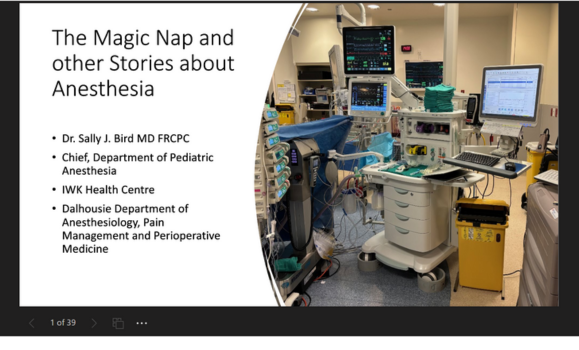Exploring modern medicine
» Go to news mainDalhousie’s Mini Medical School brings medicine to the public

Ever wondered what really happens when you go under anesthesia? Why gout went from the “disease of kings” to a common modern ailment? Or how paramedicine has evolved to shape emergency care in our health systems?
This year, with the help of leading researchers, physicians, and other experts at Dalhousie University’s Faculty of Medicine, you may just find out.
At Dalhousie’s 19th Mini Medical School, which kicked off on Jan. 15, 2025, experts take attendees on a fascinating journey through some of today’s most important health topics. From the power of radiology in diagnosis and treatment to the surprising truth about antibiotics, insomnia, and women’s heart health, this series provides the knowledge to help make informed choices about personal well-being.
Whether a healthcare enthusiast, aspiring medical student, or just simply someone with an interest in lifelong learning, the Mini Medical School has something for everyone.
Increasing accessibility
For the first 14 years, the Mini Medical School was hosted on campus in the Sir Charles Tupper Medical Building. It was typical to see 30-40 people attending these events. With the pandemic, the program shifted to a virtual format.
“The virtual format has been fantastic for the program,” says Dr. Stephen Miller, senior associate dean of medical education in the Faculty of Medicine. “Virtual access has expanded attendance significantly, with 110 people attending our first session on January 15, and average attendance ranging from 80 to 120 per session.”
 Dr. Sally Bird opened the 2025 season of the Mini Medical School on Jan. 15, 2025.
Dr. Sally Bird opened the 2025 season of the Mini Medical School on Jan. 15, 2025.
In recent years there have been more than 1,000 virtual attendees over the course of the eight free sessions, with participation from across North America, Europe, and as far as Australia and New Zealand.
Dr. Miller, who plans the event alongside managing director, continuing professional development and medical education (CPDME), Mary Ann Robinson, and assistant to CPDME educational research team, AnaBela Sardinha, with the support of MedIT specialists, says hosting the event virtually allows people to enjoy the sessions from their own homes, on their own terms, while still maintaining interactivity.
“The audience is very loyal and highly engaged, and they ask great questions because they truly want to learn. It’s exciting to see 100 people in a room eager to learn something new.”
Presentation topics are all valuable and unique and reflect what the public wants to hear.
“There’s a huge range of topics we get as suggestions from participants, and we collate those into themes at the end of the year,” says Dr. Miller. “Lately we’ve found that people seem to be really interested in understanding about navigating the healthcare system, and we do have a session on that coming up this season.”
Looking ahead
Though the 2025 sessions have long been confirmed, Dr. Miller and his team are already thinking about next year’s program, which promises to tackle some of the most pressing issues in healthcare today.
“AI is definitely a big one,” says Dr. Miller. “Another topic I can see us revisiting is planetary health and the climate crisis. We’re all seeing its effects month after month, around the world and here at home—floods, fires, and other extreme weather events. We’re now witnessing its impact on patient care. Emergency departments are seeing cases directly linked to climate change, which wasn’t common before.”
Dr. Miller expects the crisis in primary care and access to healthcare providers will also take center stage, with a potential discussion into how medical education and systemic changes can address these shortages.
Valuable information
Presenters, who are eager to participate, are chosen through a thoughtful process that incorporates an anti-oppressive lens and prioritizes diversity. A range of factors are considered, including geographic representation from areas like New Brunswick and beyond Halifax, as well as visible and invisible minority representation. While the goal is to include diverse voices, the team is mindful of not overburdening individuals from underrepresented groups, who are often in high demand due to their specialized expertise.
To ensure the content is accessible and engaging for a public audience, Dr. Miller offers to meet with each presenter individually, recognizing that many are accustomed to presenting exclusively to medical professionals. Feedback, which participants provide after each session, is overwhelmingly positive.
“You can see in the comments at the end of the presentations that they really value the information and use it to their benefit,” says Dr. Miller. “People really seem to find it helpful to understand how the medical system works.”
Members of the public are invited to attend any or all of the upcoming Mini Medical School evenings, which run from 7:00pm-8:15pm AST until March 5, 2025. It is not necessary to register in advance and you are welcome to attend only the session or sessions of interest to you.
Click here for the schedule and participation link.
Recent News
- New global study Highlights the Biological Roots of Anxiety
- Dalhousie and NCIME launch first‑of‑its‑kind program in Membertou First Nation
- A message from Wanda M. Costen, PhD, Provost and Vice President Academic
- Rhodes scholar Sierra Sparks returns home to study medicine
- President Kim Brooks, Dr. Pat Croskerry appointed to Order of Canada
- Dal’s Highly Cited Researchers reflect on influential global research alliances
- A New Bursary Supporting Black Medical Students at Dalhousie
- Dalhousie’s first physician assistant cohort steps into Nova Scotia’s healthcare system
